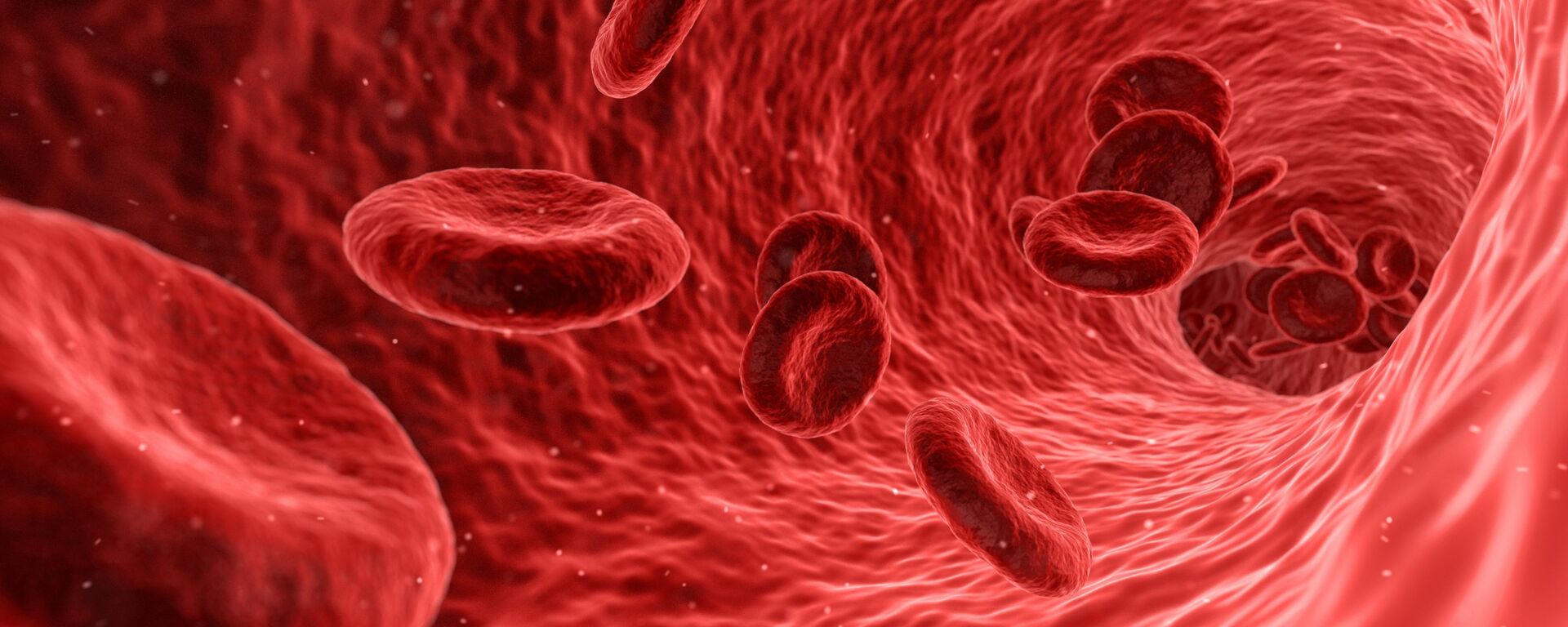https://sputnikglobe.com/20230417/bear-facts-about-how-hibernating-grizzlies-can-prevent-deadly-blood-clots-1109584050.html
Bear Facts About How Hibernating Grizzlies Can Prevent Deadly Blood Clots
Bear Facts About How Hibernating Grizzlies Can Prevent Deadly Blood Clots
Sputnik International
The correctly identified protein behind blood clotting may help develop correct medication against diseases affecting millions of humans across the globe.
2023-04-17T07:18+0000
2023-04-17T07:18+0000
2023-04-17T10:12+0000
science & tech
bears
brown bears
scandinavia
blood clots
medicine
health
https://cdn1.img.sputnikglobe.com/img/104228/01/1042280111_0:37:1280:757_1920x0_80_0_0_217a92026e98c0d62e9d2e9a02d2a51f.jpg
Long periods of inactivity may cause major pain and even present serious health hazards, leading to life-threatening blood clots throughout the body. Nevertheless, this danger doesn't affect bears who lay nearly motionless for months at a time.A team of Scandinavian researchers has collected and studied the blood of brown bears for 13 years in both the summer and winter in order to get to the bottom of how they prevent blood clots. The bears were tranquilized, had their blood samples taken, and returned to their dens to finish up their naps.A denizen of the northern woods, the brown bear hibernates between October and April or even May, depending on the temperature. During this period, the bear consumes body fat and lowers its body temperature. The key to why their bodies aren't broken down by such long periods of idleness, however, is that hibernating bears produce less of a protein that helps the blood to clot, scientists have discovered.The protein, called HSP47, was discovered to be abundant in the bears' blood during the summer, but nearly disappeared in the winter. This HSP47, found on the blood cells, known as platelets, activate neutrophils, causing them to trap proteins, pathogens, and other cells in nets, which leads to blood clot formation. Since hibernating bears produce less HSP47, their blood is less likely to coagulate.Fittingly, much lower levels of the HSP47 protein were recorded in people with spinal cord injuries, who don't seem to have blood clots, despite being largely immobile. This suggests that their bodies were slimming down HSP47 production to match the condition. In a test run, the crew had about a dozen healthy volunteers spend nearly a month in bed, while monitoring their protein levels. To their surprise, their HSP47 levels dropped as well, proving the researchers' initial hypothesis.This breakthrough in biochemistry may someday prevent deadly clotting in humans. Current treatments of a condition known as deep-vein thrombosis are only partially effective and involve blood thinners, which at times can lead to uncontrolled bleeding.Blood clotting affects millions of people worldwide, with an estimated frequency of two cases in 1,000 people aged 50 and over. It can cause varying degrees of discomfort, impeding circulation and leading to swelling.Some of the complications of blood clotting may be life-threatening. If a clot blocks blood flow in a vein or artery, the tissue normally nourished by that blood vessel can be deprived of oxygen, and cells in that area can die. During the COVID-19 pandemic, both the virus itself and some of the vaccines against it were linked to risks of serious blood clotting.Based on health data from Europe and the US, an increased risk of thrombosis with thrombocytopenia syndrome (TTS) was documented after widespread use of major COVID-19 vaccines such as AstraZeneca, Johnson & Johnson and Pfizer-BioNTech. While the syndrome remained rather rare, researchers warned the observed risks should be considered when planning further immunization campaigns and future vaccine development."
https://sputnikglobe.com/20220601/blood-clots-in-covid-19-patients-affected-by-innate-immune-system-study-finds-1095913354.html
scandinavia
Sputnik International
feedback@sputniknews.com
+74956456601
MIA „Rossiya Segodnya“
2023
News
en_EN
Sputnik International
feedback@sputniknews.com
+74956456601
MIA „Rossiya Segodnya“
Sputnik International
feedback@sputniknews.com
+74956456601
MIA „Rossiya Segodnya“
blood clotting, brown bears, hibernating bears, winter hibernation, breakthrough in biochemistry
blood clotting, brown bears, hibernating bears, winter hibernation, breakthrough in biochemistry
Bear Facts About How Hibernating Grizzlies Can Prevent Deadly Blood Clots
07:18 GMT 17.04.2023 (Updated: 10:12 GMT 17.04.2023) The accurately pinpointed protein behind blood clotting may help contribute to the creation of a precise medication to fight diseases affecting millions of people worldwide.
Long periods of inactivity may cause major pain and even present serious health hazards, leading to life-threatening blood clots throughout the body. Nevertheless, this danger doesn't affect bears who lay nearly motionless for months at a time.
A team of Scandinavian researchers has collected and studied the blood of brown bears for 13 years in both the summer and winter in order to get to the bottom of how they prevent blood clots. The bears were tranquilized, had their blood samples taken, and returned to their dens to finish up their naps.
A denizen of the northern woods, the brown bear hibernates between October and April or even May, depending on the temperature. During this period, the bear consumes body fat and lowers its body temperature. The key to why their bodies aren't broken down by such
long periods of idleness, however, is that hibernating bears produce less of a protein that helps the blood to clot, scientists have discovered.
The protein, called HSP47, was discovered to be abundant in the bears' blood during the summer, but nearly disappeared in the winter. This HSP47, found on the blood cells, known as platelets, activate neutrophils, causing them to trap proteins, pathogens, and other cells in nets, which leads to blood clot formation. Since hibernating bears produce less HSP47, their blood is less likely to coagulate.
"For the first time, we can say that this is something similar to a breakthrough when it comes to blood clots. It can form the basis for developing medicines," Ole Frobert, a professor at Orebro University (Sweden) and Aarhus University (Denmark) told Norwegian media.
Fittingly, much lower levels of the HSP47 protein were recorded in people with spinal cord injuries, who don't seem to have blood clots, despite being largely immobile. This suggests that their bodies were slimming down HSP47 production to match the condition. In a test run, the crew had about a dozen healthy volunteers spend nearly a month in bed, while monitoring their protein levels. To their surprise, their HSP47 levels dropped as well, proving the researchers' initial hypothesis.
This breakthrough in biochemistry may someday prevent deadly clotting in humans. Current treatments of a condition known as deep-vein thrombosis are only partially effective and involve blood thinners, which at times can lead to uncontrolled bleeding.
Blood clotting affects millions of people worldwide, with an estimated frequency of two cases in 1,000 people aged 50 and over. It can cause varying degrees of discomfort, impeding circulation and leading to swelling.
Some of the complications of blood clotting may be life-threatening. If a clot blocks blood flow in a vein or artery, the tissue normally nourished by that blood vessel can be deprived of oxygen, and cells in that area can die. During the COVID-19 pandemic, both the virus itself and some of the vaccines against it were linked to risks of serious blood clotting.
Based on health data from Europe and the US, an increased risk of thrombosis with thrombocytopenia syndrome (TTS) was documented after widespread use of major COVID-19 vaccines such as AstraZeneca, Johnson & Johnson and Pfizer-BioNTech. While the syndrome remained
rather rare, researchers warned the observed risks should be considered when planning further immunization campaigns and future vaccine development."


